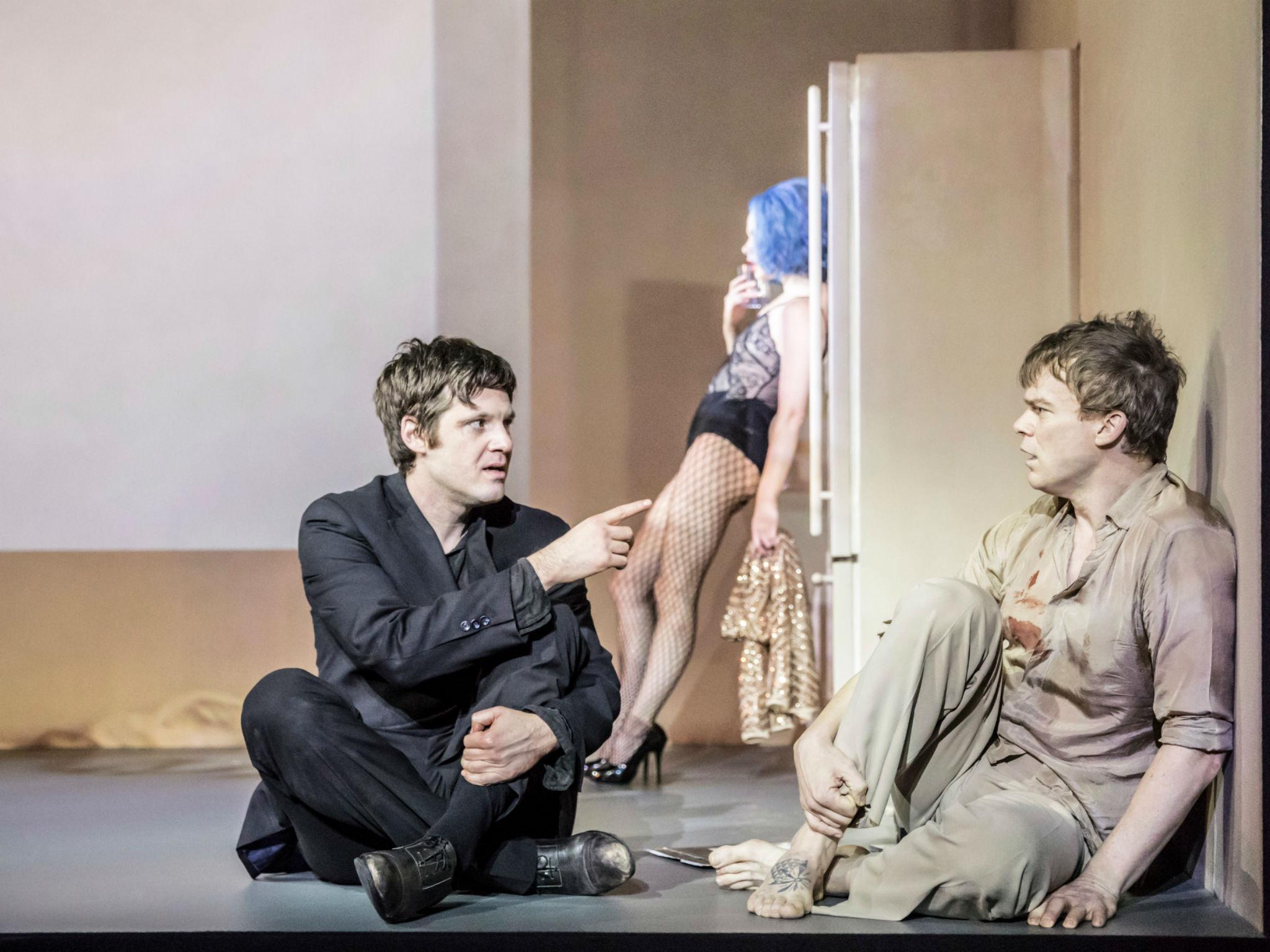Lazarus, King's Cross Theatre, London, review: David Bowie's parting gift to the world
Inspired by the book, ‘The Man Who Fell To Earth’ by Walter Tevis, this musical by David Bowie and Enda Walsh, has transferred from New York with Michael C Hall reprising his role as an alien

David Bowie was the most theatrically-minded of all rock stars. This was apparent not just in his donning and doffing of masks and alter egos (Ziggy Stardust, Aladdin Sane, Thin White Duke et al) or in his forays into “legitimate” theatre (such as his acclaimed Broadway stint as John Merrick in The Elephant Man). Bowie buzzed, too, with ideas for stage shows. For various reasons, these were all frustrated. The George Orwell estate, for example, frowned on his plans for a musical based on 1984.
It’s sad to to reflect that Lazarus – the piece he worked on, while secretly battling cancer, in his final year – is simultaneously the first of his theatre projects to come to full fruition and his parting gift to the world (together with the album Blackstar). How consoling, though, to discover what a rare and mesmeric testament this is. Ivo van Hove directed the world premiere in New York. Partially recast (with some terrific home-grown talent joining the knock-out line-up of American performers who’ve come over to reprise their roles), the Belgian maestro’s superlatively staged and sung production is remounted now in London at a custom-built 960-seat pop-up venue near King’s Cross tube station in London.
Lazarus is sequel of sorts to The Man Who Fell To Earth, the 1976 Nicolas Roeg film in which Bowie starred – or, more strictly, to the Walter Tevis novel on which the movie was based. Thomas Jerome Newton – the extraterrestrial who came in search of water for his drought-stricken planet – is still stranded here decades later. Holed up in his New York apartment, he subsists on a diet of gin, Twinkies, and forlorn memories of his blue-haired lover, Mary Lou. “Bullied by a broken mind” (though we don't hear much about those government experiments in this piece), he's a creature unable to die, sleep, or return home.
The title song is the first to be sung: “Look up here, I’m in heaven/I’ve got scars that can’t be seen/I’ve got drama, can’t be stolen/Everybody knows me now”. Michael C Hall (of Dexter fame) is hypnotically brilliant as Newton. His voice is fuller-bodied than Bowie's but there are uncanny similarities of intonation. Vocally and through the contortions of his muscular frame (it’s a performance of disciplined physical abandon), he powerfully suggests the neuralgia-cum-numbness of agonised alienation. Newton’s assistant Elly (Amy Lennox) falls into the vortex of his world and loses the sense of her own identity as she tries to reinvent herself as Mary-Lou by dyeing her hair blue and rifling the stash he’s kept of the latter’s lingerie.
Bowie wrote three eloquent new songs for this show and the extraordinarily gifted fifteen-year-old performer, Sophia Anne Caruso, brings a shattering plangency to the lovely “No Plan” – “Here there’s no music here/I'm lost in streams of sound/Here am I nowhere now? No plan”. Caruso portrays the Girl, an ethereal waif who seems to be suspended between death and life. She knows she’s been sent on a mission but what exactly? She eventually works out that it's to help Newton return to his planet and, in one of the simplest and most poignant images in the production, she builds a rocket onstage by creating its outline in masking tape
Jukebox musicals are often concocted to take punters on a feel-good, sanitised trip through a career. The collaboration between Bowie and Irish writer Enda Walsh transfigures the genre, even if Walsh’s story-telling is sometimes opaque and even if you can’t always find an obvious reason for why he’s matched particular songs to specific dramatic moments. The score ranges through the entire back catalogue, featuring classics such as “Life on Mars” and “Heroes” and avoiding the obvious (there’s no “Starman”) in favour of deeper cuts like “Always Crashing in the Same Car” and “This Is Not America”.
I’d be hard put to pin down the precise significance of Michael Esper’s superb Valentine, who proves that a man may smile and smile and be a serial killer, or to explain why the key redemptive act seems to be so brutally paradoxical. The deep imaginative integrity of this meditation on despair, hope and the seeking of release is, however, beyond question. As is the flawless expressiveness of the staging. Newton’s apartment is chic, beige minimalist – the terrific eight piece band are rather eerily sealed off behind two Plexiglass windows (set by Jan Versweyveld). On the central video wall and spilling off it, Tal Yarden’s video design gives us brilliant access to Newton’s tormented mind in a virtuosic stream of imagery – whether it be the static that paralyses the whole stage at one point, or dreamy footage of Berlin and New York, or a gradually engulfing blood stain. Like the black balloons that bob onstage to suggest one horror or the sudden paroxysm of bright light that signals another, it’s all unforgettable. The piece lasts, without interval, for one hour and fifty minutes. I sat rapt throughout.
Join our commenting forum
Join thought-provoking conversations, follow other Independent readers and see their replies
Comments
Bookmark popover
Removed from bookmarks